A Father’s Love – Building The Last of Us Episode 1

In one horrific night, Joel’s life is changed forever. As the player’s introduction to the world of The Last of Us, the evening spent with Joel, Sarah, and Tommy as the cordyceps outbreak changes everything cements the tone, style, and stakes of the franchise’s world. Whether you experienced that opening nearly a decade ago, or just recently via The Last of Us Part I on the PlayStation 5 console or The Last of Us on HBO, Joel’s harrowing night is an effective and necessary introduction to fully understanding Joel and Ellie’s journey throughout the rest of the game.
To help us understand how that sequence came to be, and how its legacy lives on today, members of the Naughty Dog team and HBO show spoke about the work undertaken originally to create such an evocative opening, and how The Last of Us Part I brings these moments to fresh life.
Spoilers ahead if you haven’t played or watched The Last of Us!
Play Video
The End Is the Beginning
While the introduction is also The Last of Us’ first chance to leave an impression on the player, the Naughty Dog team obviously iterated and adjusted this sequence throughout development. One of the most significant among those? Players would have, originally, had control of Joel much earlier.
“The beginning of the game was one of the last things we got finalized when we were making The Last of Us,” Naughty Dog President and The Last of Us Co-Director Neil Druckmann said. “For a long time, the plan was to play as Joel, not to play as Sarah, and you as Joel would hear commotion over at your neighbor’s house, you would walk over there, you’d see they’re infected. Then you’d head back and grab your daughter…and then everything else [in the final game] was how it was planned.”
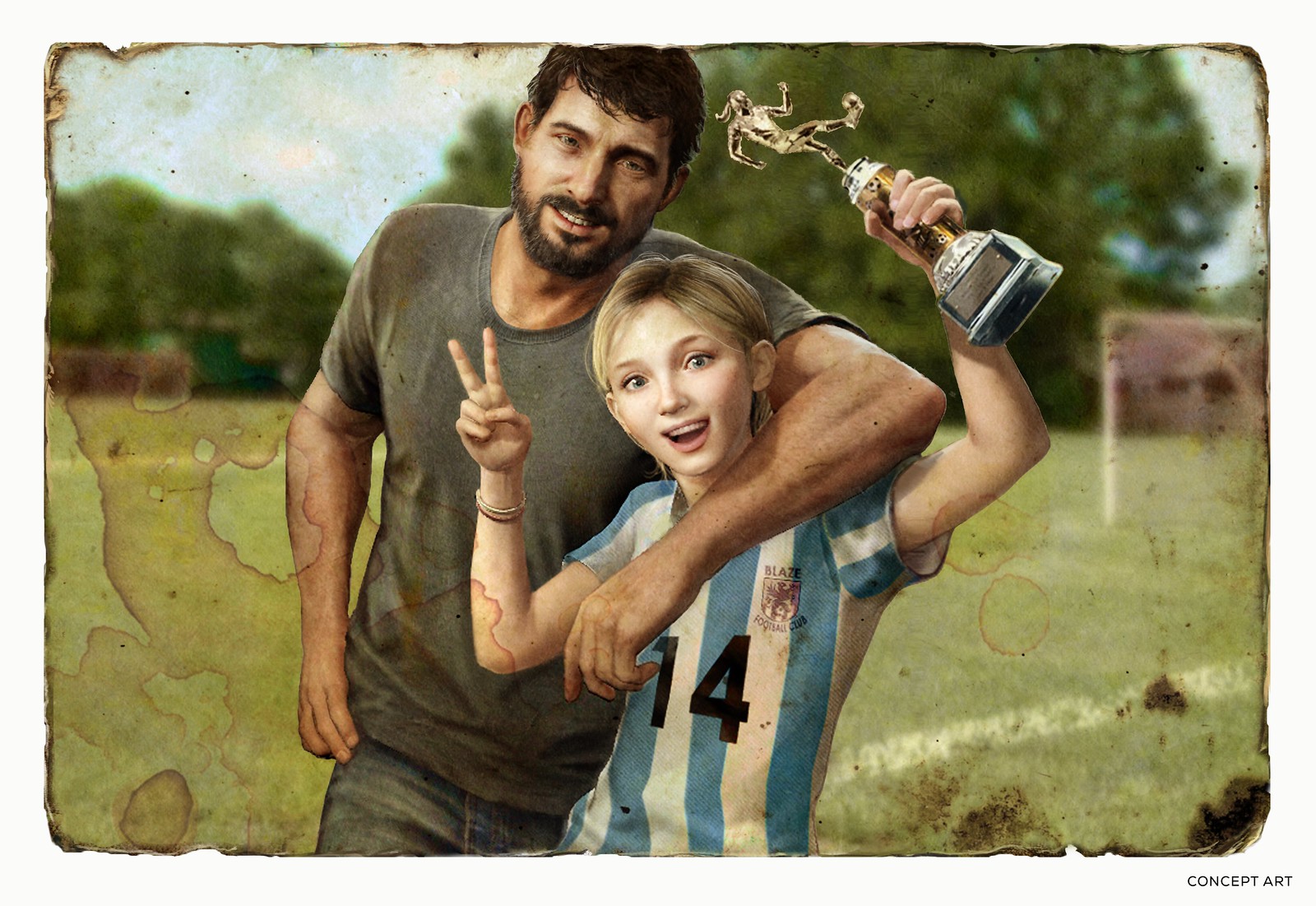
But starting the adventure and experiencing all that through Joel’s perspective felt… familiar to the team. In wanting to differentiate the story from others in its genre, the idea of playing as Sarah came up during a design brainstorm. With that, “everything kind of fell into place” according to Druckmann.
“That felt like a really unique take on [this story]. The fact that you’re seeing it through a very innocent child made everything creepier, scarier, and that became the north star,” he continued. Having that defined perspective affected the entire team’s approach to bringing that introduction to life.
“There always had to be a reason for what you heard, and there always had to be an emotion tied to it,” SIE Sound Director and Lead Audio on the original The Last of Us Phil Kovats said, noting Sarah’s perspective allowed the devs to evoke that authentic emotion as Sarah wakes up on a dark, mysterious night.
“She didn’t know anything bad was happening, but she couldn’t find her dad,” Kovats explained. “That feeling of disconnection and worry had to be portrayed, [so we had] stark, quiet sounds mixed with, say, the TV that was loud, [or] the explosion that shook the room. …Everything was there to create this uneasy tension that was palpable at that moment.”
That’s also true of the immensely important art direction for a sequence like this. Before Sarah awakens in confusion late into the night, she gets to spend a bit of time with her dad, and we see her and Joel bond. It’s a moment paramount to conveying the emotions the developers hope players feel as the entire sequence plays out.
“In the beginning of that game, it was very important to build the relationship of Joel and Sarah,” Art Director Erick Pangilinan said. “During that [sequence], we wanted to keep the lighting very warm, to keep them looking closer and to build that relationship together. Our lighting is very soft, with a more homey feel, and then when things go bad, we move the lighting a little further. When you do that, you create tension, you create longer shadows, you create more contrast in the scene, you put the player in darkness, and you push the player toward the light.”

Pushing the player toward that light pushes Sarah to any shred of hope in a world quickly descending into chaos. Joel eventually comes home, and the gravity of the night begins to creep its way into Sarah’s life, as he, Sarah, and Joel’s brother Tommy hit the road in search of safety. In such an economical sequence, every minute is essential to conveying story, character, and plot to the player, but in a way that feels earned and honest to the moment. As Tommy and Joel debate what to do and discuss the panicked state of the world, the player controls Sarah, with a 360-degree view as the trio drives…anywhere.
“Once you get into the car, you have the tension being raised by police cars going through with all their lights spinning around. You see all these vignettes, like the burning house, the headlights that shine on the family that’s being left, but the view is very claustrophobic,” Pangilinan noted of how the developers crafted the emotions of the scene.
“One of the most important things to show in that drive was the family that’s asking for help, and Joel saying, ‘Don’t stop. We don’t know if they’re sick or not.’ And it’s at that moment, Joel shows you who he is,” Druckmann explained.
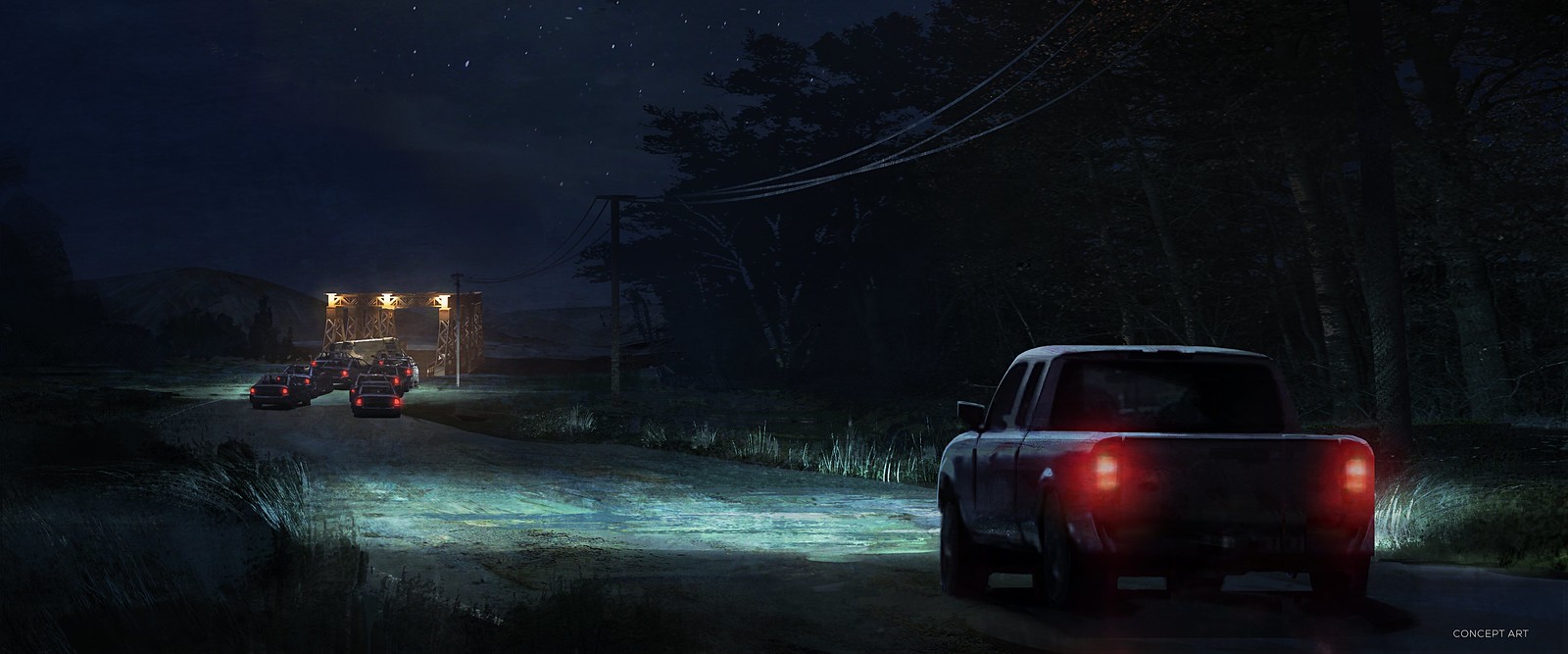
The drive culminates into a desperate run through town, in which Joel’s car is T-boned by another driver, and the severity of the moment ratchets up, while also providing the developers a chance to adjust the perspective of the scene.
“It’s in that commotion, all of a sudden, you come to, and you’re a different character, you’re breaking the window, and now you’re grabbing Sarah. Now you are the father instead of the daughter,” Druckmann said.
“[Because this level was completed near the end of development], the chaos of trying to finish the game made its way into the chaos of what was happening, and we felt that that really was the emotion, was confusion, chaos, being disjointed, not knowing what was going to happen,” Kovats explained.
The chaos heightens to a fever pitch as Joel carries an injured Sarah away from shouting civilians, growling infected, and raging fires. But just when he thinks he’s fleeing away from the scene, he’s held at gunpoint, with a soldier clearly receiving instructions to kill him. In a bid to protect his daughter, Joel turns just as the soldier fires, but, it’s not enough. Joel loses his world in a stark, brutal moment.
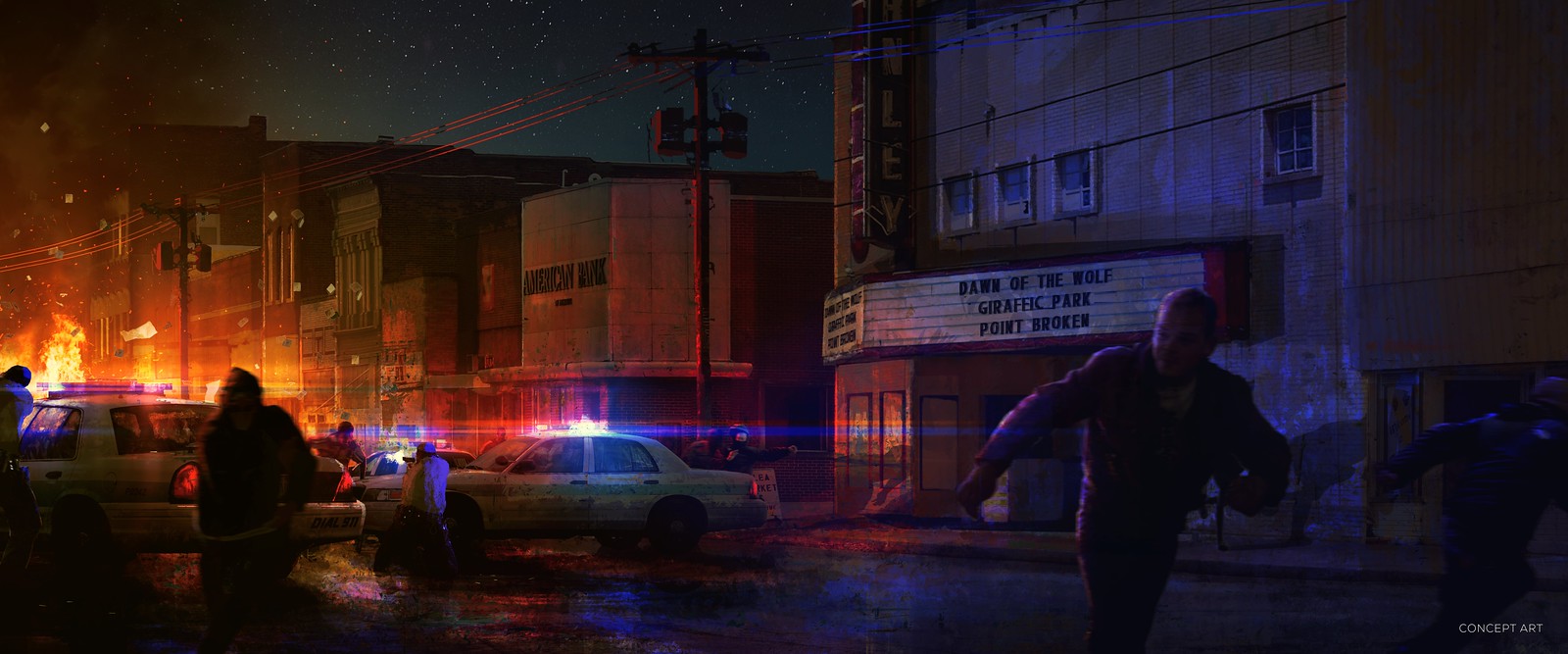
“The simplicity of Sarah’s death was actually really hard to get to,” Druckmann explained. “I had made the mistake of hyping up that scene to Troy [Baker], and just talking about how impactful it is because it sets the stage for the rest of the story. And then when we went to capture it, it always felt really big to me, like overly dramatic.”
While the performance was moving enough to cause some crew members to even need to walk off the set that day, while in the edit for the game, Druckmann realized the original take of the sequence wasn’t quite capturing what he wanted to. Thankfully, the team had another go at filming the sequence on the motion capture stage.
“I felt there was more to mine there. It could be even better. I had to swallow my pride because I feel my job as a director is to say when we got it, when we don’t got it, and I was like, ‘I made a mistake. We should’ve kept going,’” Druckmann said.
And with a better understanding of what he wanted the sequence to convey, the team was able to find the honesty of the scene in this second go-round.
“When we were shooting it the second time, I was like, ‘I don’t want you to focus on the tragedy of it. Really focus on the mechanics of what you’re going to do next. She’s hurt, where are you going to take her? First, you have to lift her. She’s in pain, okay, help her with the pain.’ And I just wanted to be as pragmatic as possible because the scene is already so sad, we don’t have to sell the sadness or the drama of it, just sell the mechanics of it. Everything else will happen naturally.”
Revisiting an Iconic Moment
Naughty Dog revisited this iconic opening, and the entirety of the first game, with The Last of Us Part I, currently available for PlayStation 5 and available for prepurchase on PC via Steam and the Epic Games Store ahead of its March 3 launch. With such an important sequence, as with the entire remake, the team sought to honor the original story being told and the gameplay experience being delivered, enhancing it with modern technology to bring out the emotion of the sequence as much as possible.
“The [original game] holds up very well emotionally, but with what we’re able to do with the new rigs, with the new facial set up, [the team] could really push it to the absolute limits that we’ve done,” Bryant Wilson said.
“Now, you can see the intensity on Joel’s face when he’s telling Tommy to keep them safe. He can see Tommy pleading with them to just run as he’s holding the door back from a bunch of infected. There’s a deeper emotional connection you get just watching these smaller animations that you maybe didn’t quite feel quite as significantly the first time around.”
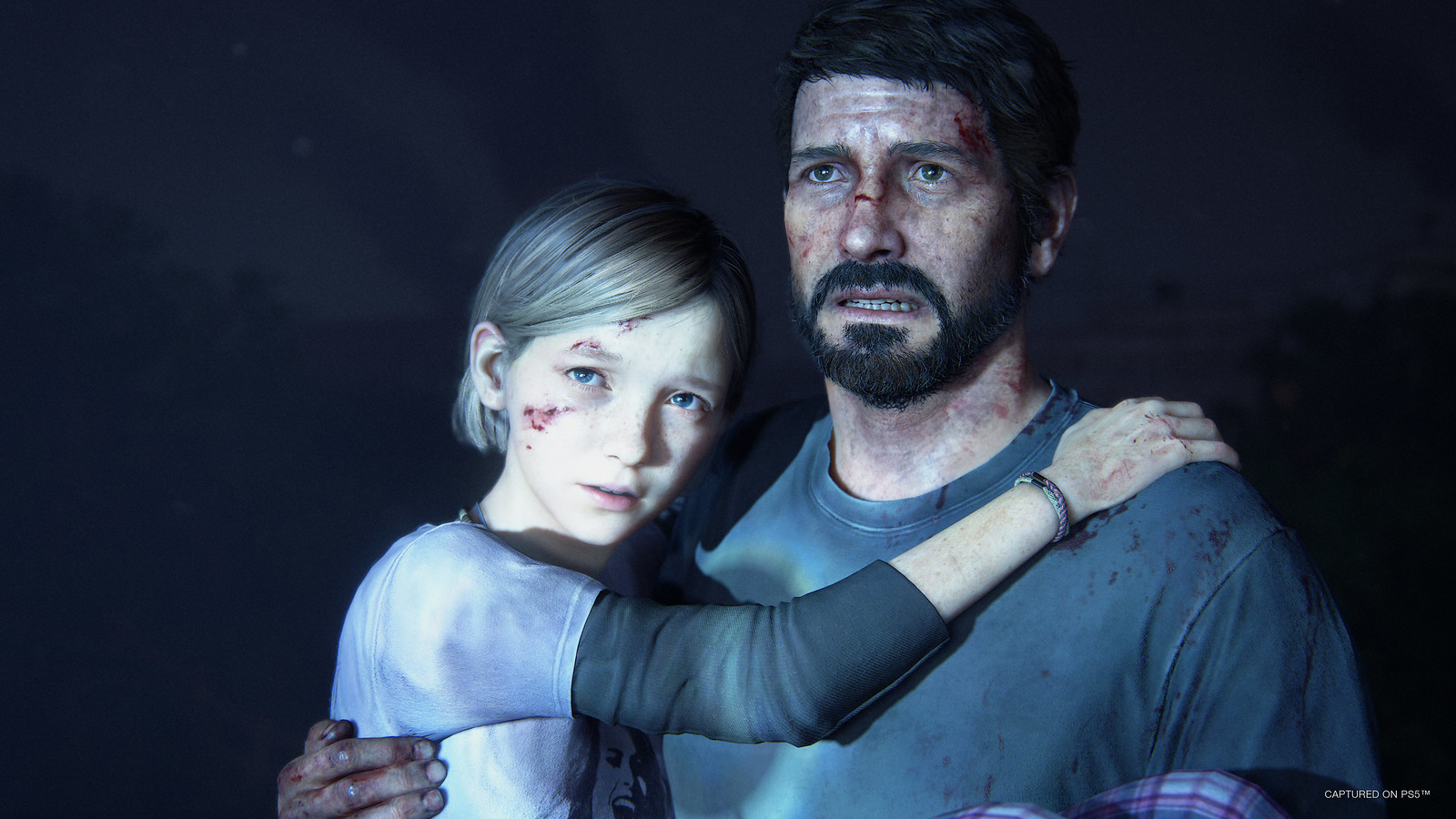
All the work done on Part I comes back to bringing forth that emotional honesty in the sequence, but in greater detail and nuance than ever before. That can mean everything from the vignettes Joel, Tommy, and Sarah pass by in their car to the cacophony that greets them in town and the way non-player characters react to the horror around them.
“They’re reacting to their environment in a way that’s much more realistic than what we had in the original,” Wilson explained.
And, of course, bringing forth the emotion of those final moments even further while preserving the work that had been originally done was key for the team.
“We wanted to keep everything backlit, and we wanted that light to focus on you and have stronger silhouettes,” Pangilinan explained. “And we wanted that soldier to be far away from you to create that distance and coldness so that you can’t read what he’s going to do, but you know that there’s that danger. That intensity of those harsh shadows keep that final moment very intense.”
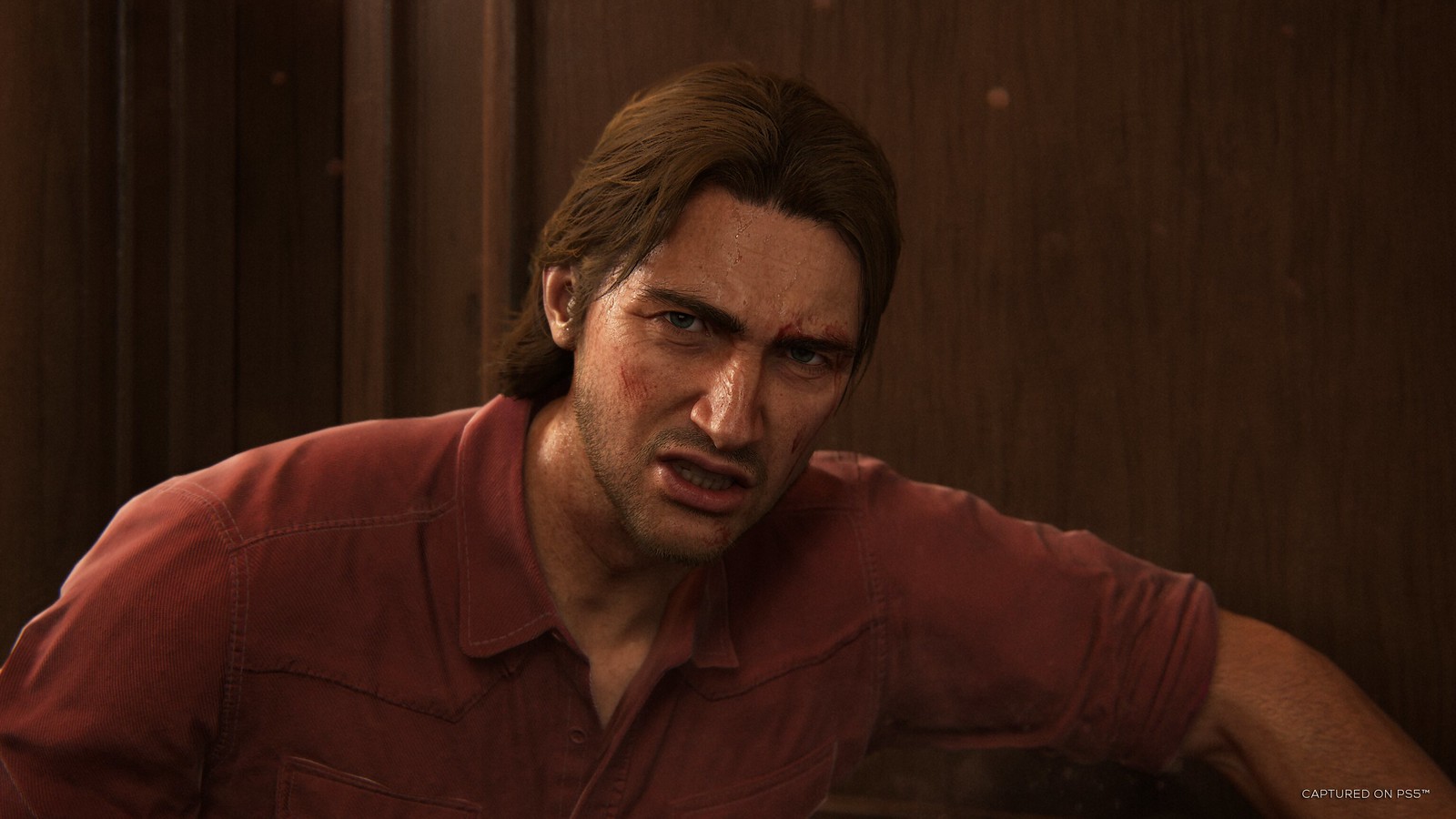
And this whole sequence is one that, 10 years later, Druckmann, along with executive producer Craig Mazin, has revisited in an entirely new way with The Last of Us TV show. While viewers will know by now (though, spoiler alert if you haven’t yet watched!) that many of the familiar beats longtime fans would expect are there, the first episode of the HBO series spends more time outside of this night, and finds new ways of evoking the tension and horrors of this sequence.
“I think Neil and I were both excited by the idea that we could actually add a little bit more context to Joel and Sarah’s relationship and explore just a little bit more with Sarah,” Mazin said. “What we couldn’t do was give the audience the feeling that I had, and every player I assume had, when they first started playing the game, where you are Sarah, and you wake up, and you can’t find your dad, and you go downstairs, and that, we couldn’t give them that, not in the same way.”
We see more of Joel and Sarah, and their relationship, leading up to those fateful moments.
“Let’s show them waking up, let’s show them having breakfast, let’s show Sarah going to school, Sarah going to get her dad’s watch fixed, more hints of the outbreak,” Druckmann explained of their approach.
“But more important than that was to build these characters out even further, specifically Sarah and specifically her bond with Joel.”
Another difference the show delivers is more time spent with Tommy and coming to better understand him pre-outbreak. Some of those elements weren’t there originally, but came about when Druckmann and executive producer Craig Mazin and their team had reshoots for the pilot.
“That breakfast scene [in the premiere] is one of those scenes that initially when we shot it, Tommy wasn’t there, and we had a budget to reshoot some of the stuff in the pilot, and that’s one of those ideas that we came up with,” Druckmann said. “We got him into that breakfast scene, and that phone call where Joel has to bail him out of jail, that was part of the reshoot as well.”
“You see pretty quickly that Tommy’s more than capable of taking care of himself, in fact, it’s Tommy who saves Joel’s life [in the premiere],” Mazin said. “And that interesting concept of who needs saving and who’s going to do the saving is a theme that we will bring up over and over and over.”
Those additions were essential for the actors too, who saw solidifying this family bond from the get-go as a major factor of the show and, in particular, Joel and Tommy’s relationship.
“I wanted to put into the balance of what Joel isn’t that Tommy is. This family we meet very early in the show, and, of course, we meet in the game, you want to give them life, you want to give them the realistic sense of family and love and what these guys are to each other,” Gabriel Luna, who plays Tommy on The Last of Us, said. “I’m the younger brother that’s always needling him and keeping him on his toes, but I’ll also be the guy that is always there. No matter how much crap we give each other, he can always call on me, and I can always call on him when I get in a pinch.”
And for the actor behind Joel, Pedro Pascal, understanding the heart and emotion behind this entire opening is essential to his, and the audience’s, understanding of who Joel is.
“Joel’s loss is, I think, the centerpiece of his existence as a character because I think he dies with his daughter, and, as he sees it, staying alive is really an empty function,” Pascal said. “And I don’t think that he sees himself, which makes him capable of really dark things because I don’t think that he sees himself as human without being in the light of the love of his daughter, meaning something to somebody.”
Both the ways in which the show follows the blueprint of the game, while also finding space to find new pathways to explore the world further solidifies what is at the heart of The Last of Us, no matter the medium – its characters.
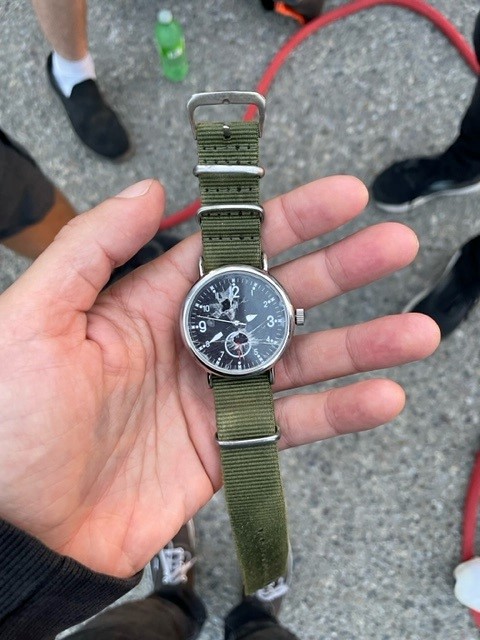
“I could really relate to this guy that doesn’t really feel like celebrating his own birthday, and the idea of his whole world is it’s a small one. It’s his daughter and his brother, and we don’t really know anything else outside of this small family that is everything to him until the world at large completely starts to come apart,” Pascal said.
One of the premiere’s most harrowing moments is, of course like the game, Sarah’s death. And though Druckmann came to the show with an understanding of what did and didn’t work for the game’s version, Mazin, who directed the debut episode, explained how the TV version came with its own unique challenges.
“We were shooting it in the summer. It was early on, and we’re far north in Calgary. That means the nights are short. So, the second the sun goes down, you’re working really hard to make sure that you get what you need,” Mazin said. “We also had a blood rig and things [you] don’t have to worry about when you’re making video games… All of this stuff is going on, plus fighting wind and everything [else]. And in the center of all that chaos, you have just two people trying to perform a moment.”
Mazin praised the work actors Pedro Pascal and Nico Parker did to bring this essential scene to life.
“There’s something about Nico, particularly when it was pain, fear, all these negative emotions that I think a lot of people find hard to portray, she just accessed them instantly, and it was remarkable to watch,” Mazin said. [And] Pedro did this beautiful thing where he just lets his denial coast until it’s no longer tenable, and then he just goes somewhere. My favorite little moment of that is the very last one…he’s holding her, and then his eyes just go really big, like he just, in that second, realized, ‘Oh, no,’ and then, boom.”
Watching the sequence unfold in a new way through the TV show offers new and old fans a chance to gain a new perspective on the events that change Joel’s life forever. For longtime players and potential new ones interested in experiencing this sequence, and the full story, firsthand, The Last of Us Part I’s improvements honor the weight and emotion of Joel, Sarah, and Tommy’s stories while bringing this classic story to new life, offering the most immersive and technically advanced way to play.
The Last of Us Part I is currently available on PlayStation 5, and available for pre-purchase on PC via Steam and the Epic Games Store until it’s release on March 3. The Last of Us airs on HBO and streams on HBO Max.




